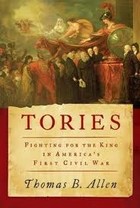The First American Civil War
 If you thought the American Civil War of the 1860’s was our first civil war, Thomas B. Allen’s latest book, Tories, Fighting for the King in America’s First Civil War will correct your notions of our civil wars. It is well known that history is written by the winners and this is never more true than regarding our war for independence.
If you thought the American Civil War of the 1860’s was our first civil war, Thomas B. Allen’s latest book, Tories, Fighting for the King in America’s First Civil War will correct your notions of our civil wars. It is well known that history is written by the winners and this is never more true than regarding our war for independence.
When pressed to name an American Loyalist (aka Torie) the name Benedict Arnold might come to mind. However, at the onset of our struggle with King George the country (aka colony) was very much divided over how to resolve the dispute. Many of the most influential leaders of industry, merchants, law and wealthy class landowners favored a more measured approach of negotiation and compromise. Clearly a common characteristic, though not universal, of this group was that they had the most to lose in a struggle with England. But, in addition, they also identified themselves as Englishmen.
On the other side of the conflict were a relative handful of learned leaders and large number of Americans with the least to lose. These Patriots saw the struggle as way to a brighter future with rewards of hard work and sacrifice. This group was the first to consider themselves Americans.
With these two divergent views of relations with England, Allen goes on to describe the struggle between the Patriots and Loyalists (Tories). The most revealing aspect of this history is the scope of inter-American conflict. Throughout the Revolutionary War, Loyalists organized themselves and actively support English forces. In nearly every battle of the war Loyalist military units were in forefront of the action. Thus, Americans were killing Americans throughout the conflict. Even non-combatants served to provide logistics support to English troops and many became active information sources spying on Patriot troop movements.
In summary, Allen’s book fills in a little known chapter in our Revolutionary war history.

Powered by ScribeFire.
Posted: August 29th, 2011 under Books.


